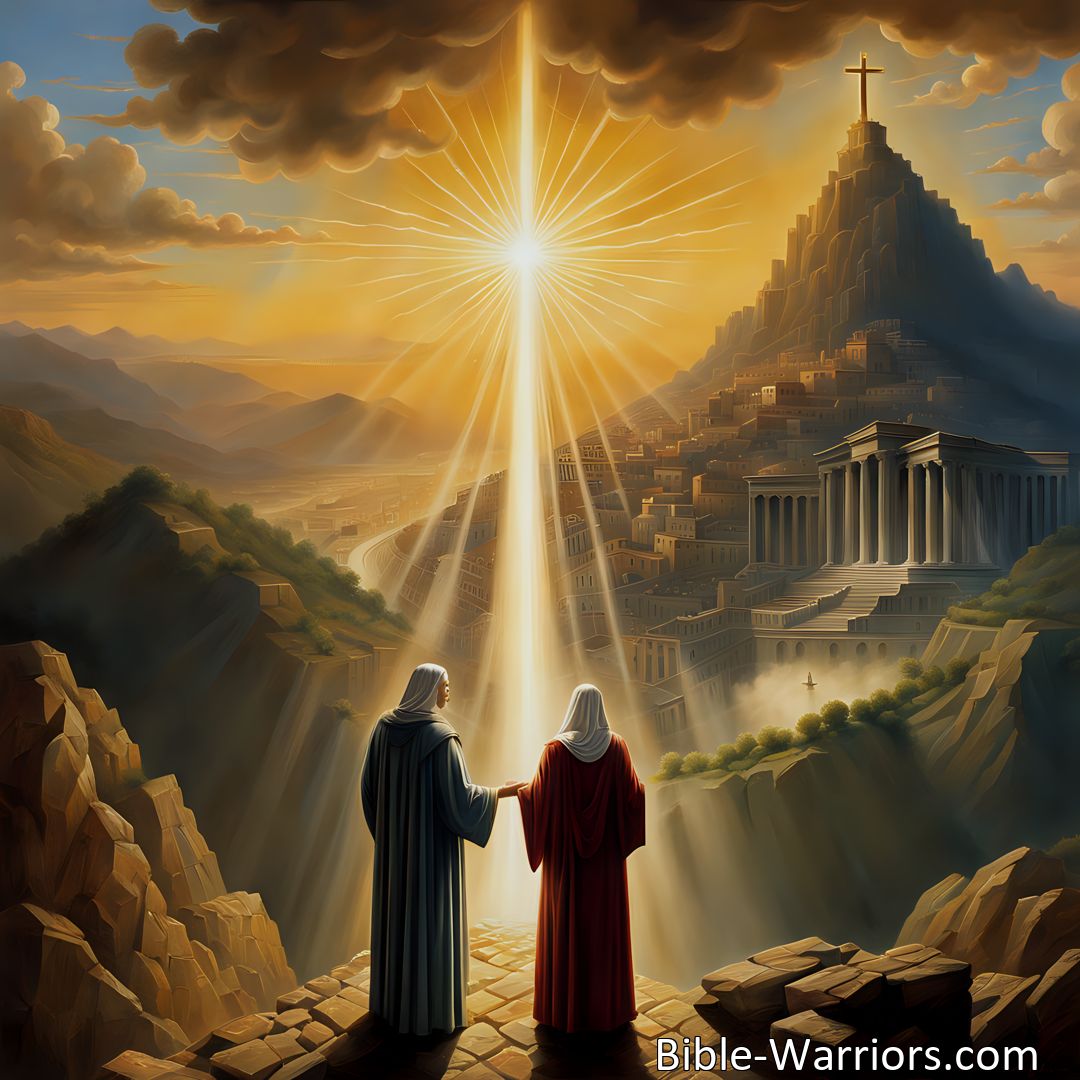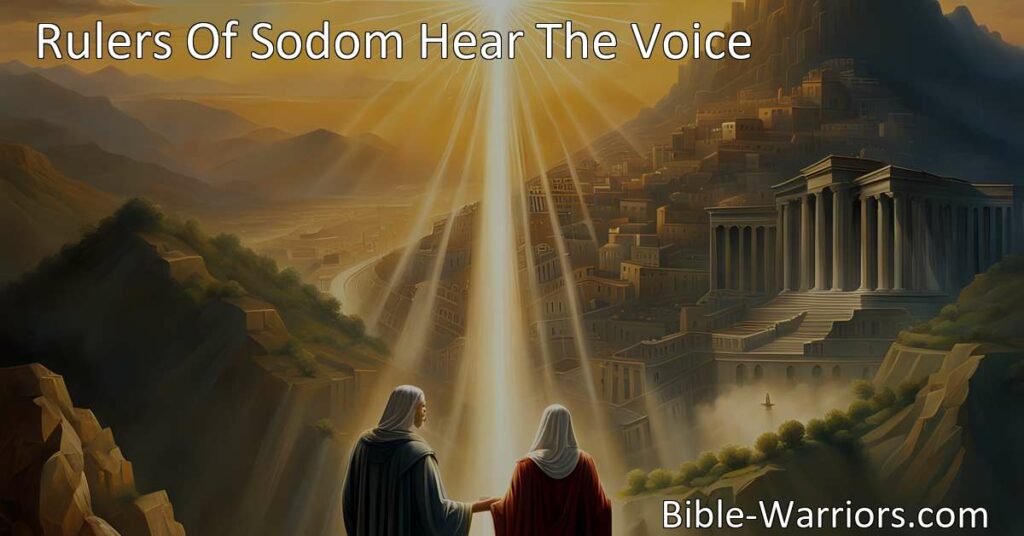Rulers Of Sodom Hear The Voice – Hymn Lyric
“Rulers Of Sodom Hear The Voice: A Call for True Worship and Righteousness” is a hymn that reminds us of the importance of sincere worship and righteous living. Addressing the rulers of Sodom and the men of Gomorrah as symbols of corrupt behavior, the hymn emphasizes that external acts of worship hold no value without genuine repentance and righteousness. It calls for reflection, transformation, and a lifestyle marked by justice, purity, and advocacy for the vulnerable. Through God’s grace, even the most stained souls can be made pure, offering hope for forgiveness and redemption.
Table of Contents
Rulers Of Sodom Hear The Voice
Rulers of Sodom, hear the voice
Of Heav’n’s eternal Lord;
Men of Gomorrah, bend your ear
Submissive to His word.
‘Tis thus He speaks; To what intent
Are your oblations vain?
Why load My altars with your gifts,
Polluted and profane?
Burnt-off’rings long may blaze to Heav’n,
And incense cloud the skies;
The worship and the worshipper
Are hateful in My eyes.
Your rites, your fasts, your pray’rs, I scorn,
And pomp of solemn days;
I know your hearts are full of guile,
And crooked are your ways.
But cleanse your hands, you guilty race,
And cease from deeds of sin;
Learn in your actions to be just,
And pure in heart within.
Mock not My name with honours vain,
But keep My holy laws;
Do justice to the friendless poor,
And plead the widow’s cause.
Then though your guilty souls are stained
With sins of crimson dye,
Yet, through My grace with snow itself,
In whiteness they shall vie.
Meaning of Rulers Of Sodom Hear The Voice – Hymn Lyric
Rulers Of Sodom Hear The Voice: A Call for True Worship and Righteousness
In the verses of this hymn, we are reminded of the importance of sincere worship and righteous living. The voice of the eternal Lord reaches out to the rulers of Sodom and the men of Gomorrah, urging them to listen and turn away from their sinful ways.
The hymn begins by addressing the rulers of Sodom and the men of Gomorrah. It is important to note that Sodom and Gomorrah were infamous cities in biblical times known for their wickedness and immorality. The hymn uses their names symbolically to represent any individuals or communities who engage in corrupt and sinful behavior.
The eternal Lord makes His voice heard, calling the rulers of Sodom and the men of Gomorrah to pay attention to His words. He questions the purpose of their offerings and sacrifices when they are polluted and profane. It is a reminder that external acts of worship hold no value if they come from impure hearts and deceitful intentions.
The hymn emphasizes that God despises rituals and outward displays of devotion when they are not accompanied by genuine repentance and righteousness. The burning of offerings and the rising incense may create a visually pleasing spectacle, but they do not please the Lord when they are detached from true worship.
The worshipper, too, is held accountable for their actions. God sees through the outward appearance of devotion and perceives the deceitful hearts. He knows all too well the crooked ways and the hidden guile that reside within. Therefore, true worship must go beyond mere external acts and involve a transformation of the heart.
In this hymn, God implores the rulers of Sodom and the men of Gomorrah, as well as all of us, to cleanse our hands and cease from deeds of sin. It is a call to reflection and acknowledgment of wrongdoing, urging us to turn away from our sinful behaviors and adopt a lifestyle marked by justice and purity.
Being just and pure in heart entails not mocking God’s name with empty praises or honors. Instead, it requires adhering to His holy laws and principles. True worship is not about going through the motions or performing religious rituals without genuine faith and obedience. It is about bringing justice to the friendless poor and advocating for the rights of the vulnerable, such as pleading the widow’s cause.
The hymn acknowledges that human souls may be stained with sins of crimson dye, symbolizing the deep-rooted stains of guilt and shame that sin leaves behind. Yet, it offers hope by declaring that through God’s grace, these stained souls can be made as pure as snow. This powerful image illustrates the transformative power of forgiveness and redemption that God offers to all who repent and seek His righteousness.
In a society plagued by corruption and wickedness, this hymn serves as a timeless reminder of the importance of sincere worship and righteous living. It emphasizes that God desires heartfelt devotion over empty rituals, and He calls us to align our actions with His commands. True worship requires us to examine our hearts, cleanse ourselves from sin, and actively pursue justice and kindness in our interactions with others.
Let us take these words to heart and strive to be true worshipers, not just in our religious practices but also in our daily lives. May we steer away from hypocrisy and empty gestures, always seeking to honor God through our genuine repentance, righteous actions, and compassionate treatment of others. As we heed the voice of the eternal Lord, may our worship and lives become a pleasing offering to Him.
I hope this hymn inspired image brings you hope and peace. Share it with someone who needs it today!



